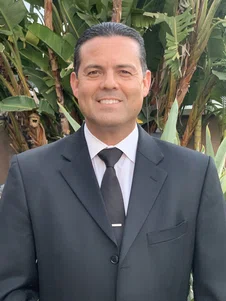My first Leadership Summit opened my eyes
From the ACSA President, Rafael Plascencia
October 14, 2024

I’ve been an ACSA member for more years than I can remember. I’ve seen the organization grow in membership and diversity, take on challenges and become a strong voice for students and administrators.
But I’ve been asked this question many times: How can ACSA be all things to all people? How can ACSA provide robust professional development and value in membership to classified members, vice principals, counselors, superintendents and everyone in between? Can you deliver to all people and grow everyone instead of a few?
I’ve used this lens as I’ve worked with colleagues and ACSA staff to build the curriculum for our Leadership Summit in November. For those of you who have never attended Leadership Summit, it’s our premier professional development event for school leaders at all levels of administration. Leadership Summit offers professional learning on current critical leadership and educational issues and provides opportunities for networking with educators who share your successes and challenges.
At my very first ACSA Leadership Summit, one workshop left an indelible mark on me. It focused on Cultural Proficiency and, more specifically, on understanding the communities we serve — particularly children experiencing poverty and homelessness. Having grown up in poverty, I felt confident in my ability to relate to my students’ challenges. But this session opened my eyes in ways I hadn’t anticipated.
As the speaker dove into the complexities of poverty, I realized that my personal experience, while valuable, wasn’t enough to fully understand or support these students. The strategies, empathy and cultural awareness required were much more intricate than I had assumed. One key takeaway was the critical importance of mental health — for both the students and school administrators. The workshop underscored how the trauma of poverty and homelessness can deeply affect students’ ability to learn, connect and thrive in a school environment. It became clear that understanding poverty wasn’t just about meeting basic needs; it also required a compassionate focus on mental and emotional well-being.
For me, it was equally important to reflect on the mental health of school administrators. As leaders, we often take on the emotional weight of our students’ struggles, and this workshop made me realize how essential it is to maintain our mental health to stay resilient and effective. Supporting students holistically means also supporting ourselves and our teams in managing the emotional demands of the job.
The last time I wrote in EdCal, I discussed mental wellness for educators. It’s an important topic to me. Educators always put the mental health of others before our mental health. I’ve witnessed it first-hand.
Mental wellness is being discussed in the public sphere more often and I think we should do more of it. I’m excited about a panel discussion we’ll be having at Leadership Summit with school superintendents sharing their stories. I want to hear from leaders about what is happening in their school communities and what I can do better to support me.
I’m not a salesman and I don’t play one on television. But I encourage you to join me at ACSA’s Leadership Summit and be the student that you advocate for each day. Participate in the workshops and listen to the speakers. Celebrate your work and the service you provide California public school students.
FYI
Online Schedule
Review all the 2024 Leadership Summit sessions at bit.ly/3ZQC1ce.




